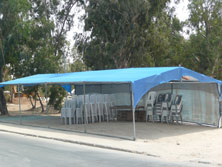 “Different cultures mourn the lost of a loved one in different ways. Here in Sderot, mourning the loss of a loved one differs from how people mourn let’s say in San Diego. In hopes of us all becoming one let me give you what I have learned by living here in Sderot.
“Different cultures mourn the lost of a loved one in different ways. Here in Sderot, mourning the loss of a loved one differs from how people mourn let’s say in San Diego. In hopes of us all becoming one let me give you what I have learned by living here in Sderot.
From time to time you see these tents pop up in different parts of town. They are “Mourning Tents”. When a loved one passes, he or she is buried that same day, unless of course they pass away on Shabbat. There are no big expensive caskets, no cement crypts lay in the ground, but only a hole dug in the earth just big enough for the body. After all Genesis 3:19 does remind us that from earth we came and to the earth we shall return.
The immediate family members sit “Shiva” for the next seven days in the home of the deceased. All pictures are removed from the walls. All couches and chairs are also removed. For the entire seven days, the family members sit and sleep on mattresses that have been placed on the floor. For the seven days, friends come and go bringing food and showing their respects and support for the family. For the most part the women stay in the house and the men gather together outside in the “mourning tent”.
The men gather together to pray among other things, the Mourner’s Kaddish prayer which is an interesting prayer. There is no mention of the one who passed, not prayer for his or her soul, there is no mention of the family left behind, no mention for peace or healing of their sorrow, and there is no mention of death.
What is mentioned and is the theme throughout the prayer is the greatness of G-D.
“Glorified and sanctified be God’s great name throughout the world which He has created according to His will. May He establish His kingdom in your lifetime and during your days, and within the life of the entire House of Israel, speedily and soon; and say, Amen.
May His great name be blessed forever and to all eternity.
Blessed and praised, glorified and exalted, extolled and honored, adored and lauded be the name of the Holy One, blessed be He, beyond all the blessings and hymns, praises and consolations that are ever spoken in the world; and say, Amen.
May there be abundant peace from heaven, and life, for us and for all Israel; and say, Amen. He who creates peace in His celestial heights, may He create peace for us and for all Israel; and say, Amen.”
The comfort for one at a time like this in not in a prayer for himself, and there is no comfort even in a prayer for the departed one. Comfort comes in remembering who G-D is and His greatness, comfort comes in praising His name
This prayer is a prayer for peace, we pray for peace to the only One who can give peace, peace between nations, peace between individuals, and peace of mind. This is, in fact, the only true comfort in the case of the loss of a loved one.
The wife of Rabbi Meir, while trying to console her husband, after the death of their two sons, said “A soul is comparable to an object which was given to us – to each individual, to his or her parents and loved ones, to guard and watch over for a limited time. When the time comes for the object to be returned to its rightful owner, should we not be willing to return it? With regard to our sons, let us therefore consider the matter as ‘The L-RD gave, and the L-RD took back, may the Name of the L-RD be blessed!”
Someone gave me this explanation as to why the Mourner’s Kaddish is recited, he said, “With the death of a person here on earth there is one less person to sing praise to the L-RD so we praise Ha’Shem in his place, that the name of Ha’Shem will always be praised.”